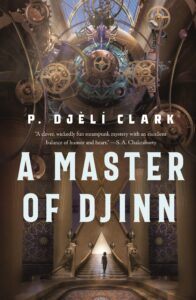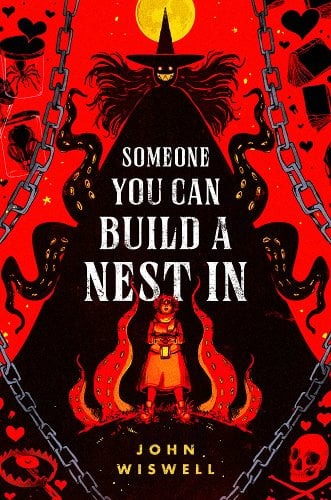A Master of Djinn by P. Djèlí Clark is many things: a steampunk mystery, an anti-colonial historical, an at once dark and whimsical fantasy, and more. But if I had to sum it up in one word, it would be fun. This book gives the reader plenty to chew on while immersing them in a rich world, an action-heavy investigation, and cheeky banter. All of that, and it stars a butch/femme power couple just finding their footing in an ever-changing world.
In this reimagined history, European colonizers were fought back around the time that the mystic al-Jahiz created a rift between worlds, which djinn and other magical beings passed through. They now coexist with human society, although there are plenty of tensions. Cairo in 1912 also boasts of its modernity, both for its steampunk technology and relatively liberal ideology—though Agent Fatma el-Sha’arawi has been trying to convince her supervisors at the Ministry of Alchemy, Enchantments, and Supernatural Entities to recruit more than one female agent.
She doesn’t anticipate the next female recruit, the ever-earnest Hadia, to be partnered with her. Fatma insists she works alone. But when someone claiming to be al-Jahiz reappears and slaughters an entire cult dedicated to him, Fatma has to work together not only with Hadia, but also with Fatma’s mysterious whirlwind of a lover, Siti, who has just come back into her life. Together, the trio and their allies must uncover the identity of the self-proclaimed al-Jahiz—before both humans and magical beings alike get caught up in further schemes.
Fatma is a treat of a protagonist, never lacking for a flamboyant suit or a witty retort. Her strong sense of justice carries the story. Siti’s charisma and secrets, as well as Hadia’s determination to prove herself, round out the main crew. Differences in religion and perspective provide interesting contracts within the group, as Fatma and Hadia are Muslim whereas Siti is considered an outcast for worshipping an Egyptian god. However, perhaps the biggest barriers to teamwork are Fatma’s stubborn sense of independence and her preconceptions about others. As her character develops, her romance with Siti as well as her working relationship with Hadia provide some delightful subplots. With the mix of human and inhuman characters throughout the cast, as well as people from all backgrounds, even characters who only briefly show up lend a lot of texture to the story and setting.
Even as a character-focused reader, the worldbuilding is especially delightful. Every single page is rich with detail, yet the author deftly avoids infodumping, instead weaving these details into the narrative. It’s difficult to make a reader feel like they’re simply in a world, experiencing a story, with magic coming alive around them, but this book managed that for me. The story continues along at an engaging clip while providing pockets of space to breathe. I had a blast watching the mystery unfold and uncovering the final plot twists.
The worldbuilding also supports the story’s themes, as issues of race, class, and colonialism are explored both within human society and through their relations with inhuman beings. I appreciated how the book was able to tie both the real world and allegorical versions of these concepts together in a way that felt natural and lent complexity to the story. The discussions of sexism feel like they tie naturally into the world and story without having to be the only barrier the protagonist faces. This book treats the issues it brings up and the violence it depicts seriously, rather than gratuitously.
Though this feels like a highly specific book, I still recommend it broadly. Mystery readers who want to dip their toes into fantasy may find this to be a good bridge, as it’s not too intimidating, being just under 400 pages and able to stand alone (though a few short fiction pieces set in the Dead Djinn Universe precede it, and one—A Dead Djinn in Cairo—is included with the novel). Fantasy readers who love worldbuilding and action will find this book to be rich with them while having a fresh take on the genre. This book is not a romance, but does have a charming romantic element for those who like a good power couple. Whether you prefer your books to be on the lighter or heavier side, this book has both comedic narration and a host of serious topics.
I can keep reviewing this book, or I can just wave it at anyone and everyone and say, “Have fun.” I hope being lost in this story delights others as much as it delighted me.
Content warnings: violence, including police violence and instances of self-mutilation, as well as racism, colorism, sexism, and colonialism. The attached short story, A Dead Djinn in Cairo, also contains suicide.

